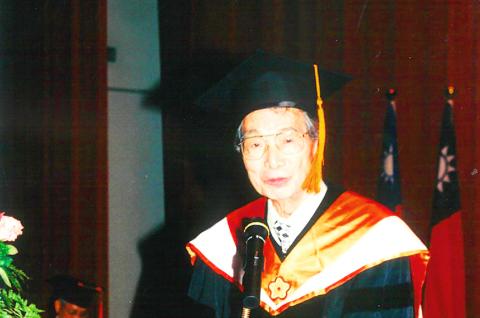Chinese-born American bioengineer Fung Yuan-cheng (馮元楨), considered the “father of modern biomechanics,” died on Dec. 15 at 100 years old, an obituary released on Friday last week by the University of California, San Diego said.
Born in 1919, Fung, who was also called Bert, obtained his bachelor’s and master’s degrees at National Central University (then located in China and later reinstated in Taiwan), before earning a doctorate in aeronautics in 1948 from the California Institute of Technology, where he was an assistant professor and researcher for 20 years.
In 1966, Fung joined the University of California, San Diego, where he cofounded its bioengineering program and recruited Chien Shu (錢煦), a renowned physiologist and bioengineer, as a lecturer.

Photo courtesy of National Central University via CNA
Chien, who is president of the Biomedical Engineering Society, has said that Fung applied the principles of fluid mechanics to biomedical engineering, and adopted a more precise and realistic way of thinking about human health.
Many of Fung’s papers were landmark achievements that built the foundation of biomechanics, Chien said.
Fung became an academician at Academia Sinica in 1968, and he received an honorary doctorate from National Central University in 2002.
In 2000, then-US president Bill Clinton awarded him the National Medal of Science, making him the first bioengineer to receive the distinction. He was also a member of the US-based National Academy of Engineering, the National Academy of Medicine and the National Academy of Sciences.
National Central University in 2008 named an asteroid discovered by the school’s Lulin Observatory 210434 Fungyuancheng, in honor of Fung’s scientific and academic achievements.

Weather conditions across Taiwan are expected to remain stable today, but cloudy to rainy skies are expected from tomorrow onward due to increasing moisture in the atmosphere, according to the Central Weather Administration (CWA). Daytime highs today are expected to hit 25-27°C in western Taiwan and 22-24°C in the eastern counties of Yilan, Hualien, and Taitung, data on the CWA website indicated. After sunset, temperatures could drop to 16-17°C in most parts of Taiwan. For tomorrow, precipitation is likely in northern Taiwan as a cloud system moves in from China. Daytime temperatures are expected to hover around 25°C, the CWA said. Starting Monday, areas

A Taiwanese software developer has created a generative artificial intelligence (AI) model to help people use AI without exposing sensitive data, project head Huang Chung-hsiao (黃崇校) said yesterday. Huang, a 55-year-old coder leading a US-based team, said that concerns over data privacy and security in popular generative AIs such as ChatGPT and DeepSeek motivated him to develop a personal AI assistant named “Mei.” One of the biggest security flaws with cloud-based algorithms is that users are required to hand over personal information to access the service, giving developers the opportunity to mine user data, he said. For this reason, many government agencies and

The National Fire Agency on Thursday said a series of drills simulating a magnitude 8.5 earthquake would be held in September to enhance the government’s emergency response capabilities. Since earthquakes cannot be predicted, only by continuously promoting disaster prevention measures could Taiwan enhance its resilience to earthquakes, agency Director-General Hsiao Huan-chang (蕭煥章) said in a news release. The exercises would be held to mark annual National Disaster Prevention Day on Sept. 21, the aim of which is to test Taiwan’s preparedness and improve its earthquake resilience in case of a major temblor, Hsiao said. As part of those drills, an earthquake alert would

DEFENSE: The National Security Bureau promised to expand communication and intelligence cooperation with global partners and enhance its strategic analytical skills China has not only increased military exercises and “gray zone” tactics against Taiwan this year, but also continues to recruit military personnel for espionage, the National Security Bureau (NSB) said yesterday in a report to the Legislative Yuan. The bureau submitted the report ahead of NSB Director-General Tsai Ming-yen’s (蔡明彥) appearance before the Foreign and National Defense Committee today. Last year, the Chinese People’s Liberation Army (PLA) conducted “Joint Sword-2024A and B” military exercises targeting Taiwan and carried out 40 combat readiness patrols, the bureau said. In addition, Chinese military aircraft entered Taiwan’s airspace 3,070 times last year, up about